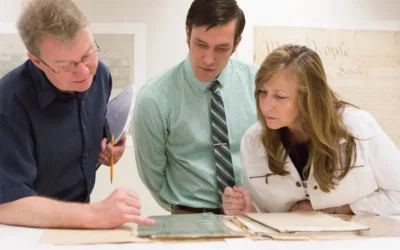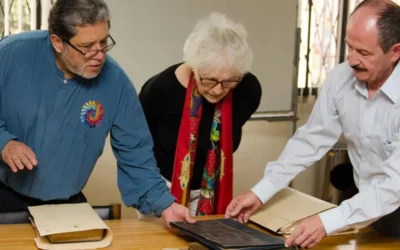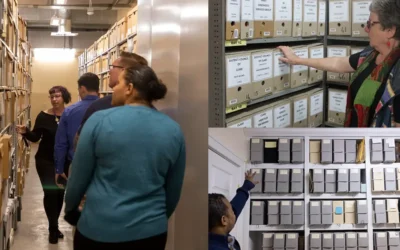Public Service Fundamentals for Archivists
Margot Note
Along with reference and access, archivists perform several public service activities to bring collections to interested researchers. For novice users, archival repositories can be intimidating, with rules and policies which may not at first make sense. Helping patrons find archival holdings relevant to their search includes a review of a number of service responsibilities.
Unprocessed Collections
Archivists have long argued the pros and cons of letting researchers use unprocessed collections—because they haven’t thoroughly scanned the items for confidential material, conservation issues, or other problems. Archivists use the activities of processing to examine and organize materials for research use; doing so allows them to identify and describe materials and create tools like finding aids that will help researches locate materials. Each repository balances the risks of opening collections for which the archives has little physical and intellectual control against the inaccessibility of holdings due to backlogs.
Restrictions
There are several restrictions that archivists uphold. Donors establish restrictions as part of their deed of gift, and additional sensitive issues may happen during processing. Confidentiality issues may arise in unexpected ways, so the archivist must be sensitive to how researchers will engage with their materials. Boxes, folders, and finding aids should be appropriately marked, so restricted materials aren’t accidentally accessed. No matter what the restrictions are, they must be clear, concise, easy to follow, and consistently enforced.
Fees
Repositories need to have both policies and procedures in terms of when fees are appropriate and when they’re not. Some archival repositories charge fees for entrance or use. These are more difficult to justify in public rather than private institutions and can incur the wrath of donors and users. Smaller repositories, especially local historical societies, may have no other way to offset costs. However, fees are generally appropriate for special services, such as copying.
Copying
Most archives do provide copies or digital scans of materials, within reason. Researchers consider this activity part of public service. Copying discourages theft; the repository saves the request form as a record of use in case materials go missing later. However, wholesale copying is time-consuming on the part of the archival staff. Some feel the existence of a copy dilutes the value of the original; there’s a loss of control and the potential for damage. Copying or digitizing fragile materials is best done by staff. If researchers request copies, the copies should bear a copyright warning.
Publication
There’s a distinction between permission to use, permission to copy, and permission to publish. Sometimes the repository has a copyright of the desired items; more often, it doesn’t—or may to some parts of a collection and not others. The deed of gift should spell out what the donor transferred, but the donor can only transfer the copyright that he or she has. Repositories often advise researchers that they must determine the copyright status themselves.
Some believe that repositories have the right to demand that researchers request permission to reproduce materials in a publication regardless of copyright. Then the archivist can advise the researcher how to cite so that the citation can lead to the material when the next person searches. Citations also help the archives to know how researchers use their collections.
A Service Industry
Working as an archivist requires customer service skills. Archivists have a broad, yet deep knowledge about the records that they manage. Preserving materials and using research and analysis skills while simultaneously providing access allows history to be made. Access to volumes of documents and engagement with their contents brings more significant meaning to the stories we tell with records of enduring value. Public services in archives offer users a better research experience towards their discoveries.
Margot Note
Margot Note, archivist, consultant, and author is a guest blogger for Lucidea, provider of ArchivEra, archival collections management software for today’s challenges and tomorrow’s opportunities. Read more of Margot’s posts here, and get your free copy of Margot’s whitepaper, Digital Sustainability: the Archivist’s Path Forward.
Similar Posts
Enhancing Collaboration; Methods for Archivists
Archivists can enhance collaboration through user-centric approaches and efficient processing methods based on customer service principles.
Navigating Selection in Archival Practice
The archival selection process is far from straightforward, given the limitations of long-term preservation and ongoing accessibility challenges.
Responsible Stewardship in Archival Practice
Responsible stewardship is a philosophy that guides the actions and decisions of archivists in safeguarding collective memory.
A Modern View of a City’s History via ArchivEra
Brief success story on City of Regina Archives’ use of ArchivEra to manage collections of legal, historical, administrative or financial significance
Hosting service
Enjoy all of the benefits of your Lucidea solution with secure, reliable, stress free hosting
Programs & incentives
No matter your size or budget, we’ve got you covered, today and tomorrow




Leave a Comment
Comments are reviewed and must adhere to our comments policy.
0 Comments